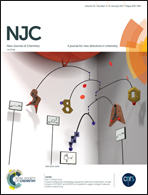A comprehensive study of substituent effects on poly(dibenzofulvene)s†
Abstract
We herein report the first cross comparison of 14 poly(dibenzofulvene) derivatives (13 novel examples and the parent poly(dibenzofulvene)) in order to understand how the choice of substituent affects the physical properties of this interesting class of semiconducting polymers. Electron withdrawing substituents decreased the polymerization reactivity and resulted in very low molecular-weight products. Di-substituted poly(dibenzofulvene)s were found to be much less soluble than the mono-analogues which can be explained by the Hansen solubility parameter system. Analysis based on absorption, emission and electrochemistry profiles suggests that polymer solubility is a very important factor that controls the degree of stacking present in the polymer due to synthetic issues. For the first time, the thermal analysis of the parent poly(dibenzofulvene) and its derivatives is reported and it was believed that depolymerization occurred much earlier than the melting transition. We have also demonstrated the orthogonal synthesis of dibenzofulvene monomers using three distinct routes (lithiation, oxidation and Wittig) to cope with functional group compatibility.



 Please wait while we load your content...
Please wait while we load your content...